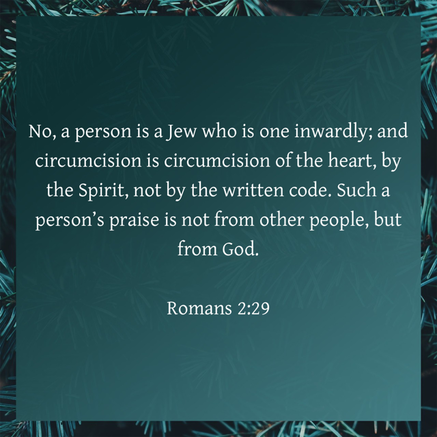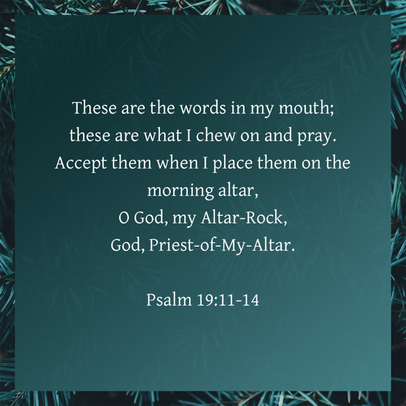|
Good morning!
We're so glad you decided to join us today!
When we meet in person, we share our joys and concerns with each other. If you have prayer requests to share, you can add them to the comments on this post. When you are ready, use this prayer to get started.
Gracious God, it is so easy to become proud of our dedication to the church and to its ministries. It is so easy to hear and enjoy the praise of men and women and even to think it equates to God’s approval as well. But you know us in the depths of our being. You know us as we really are. You see us when we are at our worse, when we fall short, when our motives are not pure and our devotion wanes.
Lord, we want to be true followers of Christ in our hearts and not just people who go through the motions. Help us to be authentic Christians. And when we fail, help us to rely on Christ and the forgiveness we have through him. We pray this in his name. Amen.
This week's lesson is on Romans 2:12-24, 28-29.
Introduction and context
In Paul’s letter to the Romans, he expresses his full vision of the new community that God has created through Jesus Christ. It is not a community that breaks from the tradition of the Old Testament and the Law. Instead, it is a community that gets to the heart of why the Law was given to Moses in the first place. It is a community in which everyone is united by a common devotion to God, shown not just by their adherence to the Law of Moses but by a deep commitment to live in a way that pleases God. By the time Paul wrote this letter, the Jewish people had been practicing circumcision for 2,000 years. It was a sign of the covenant that God made with Abraham and that continued through all of his descendants. Neither the Greeks nor the Romans practiced it — the Greeks seeing it as mutilation of the ideal body. But for the Jews, it was extremely important. It served as a physical reminder to the Jewish men and to others that they were set apart and that they belonged to the people of the covenant. The church in Rome was made up of people who had come from both Jewish and pagan backgrounds. It seems likely that Christians who came out of Judaism would think themselves superior to those who formerly were pagans. This would have created a division in the church.
Just judgment (verses 12-16)
In Paul’s time, people often expressed the distinction between Jews and Gentiles by saying that Jews were “under the law” while Gentiles were “apart from the law.” The Law, of course, is the law that God gave the nation of Israel through Moses, embodied especially in the first five books of the Bible. The Jews had studied the law of Moses for centuries. They knew it well, and it served as the basis for their faith. Yet throughout their history they also knowingly broke the law and suffered for it. They could not avoid being judged for their violations. On the other hand, Gentiles had not been given the law. Still, in the first chapter of this letter, Paul points out that they could not avoid God’s judgment by claiming ignorance. Even those outside the law, he argues, have a law written on their minds and their conscience. They will be judged for violating that law as well. So both Jews and Gentiles are under God’s judgment. Paul points out, therefore, that there is no reason for a person to think more highly of himself simply because he is among the people to whom God gave the law. What matters is obeying the law. That is something that Gentiles sometimes do, even though they don’t have the law to instruct them. The example of righteous Gentiles reveal that the law is not a matter of following rules on a page but of following the precepts God has written on every human heart, although sin has obscured our ability to see and follow them. A day will come when God will judge everyone for who they truly are — not for their lineage or for the public face they put on for others. Lack of evidence might fool human judges and juries, but God knows who we really are. And none of us is without sin.
False faithfulness (verses 17-24)
Paul uses a series of propositions to remove the Jewish Christians’ feelings of superiority. If you call yourself a Jew; if you rely on the law; if you know God’s will; if you are convinced that you are a guide for the blind, a light for those in darkness, an instructor of the foolish, a teacher of little children, he says, then what are you teachers teaching yourselves? Jews in general, and Jewish religious leaders in particular, saw themselves as guides for those who did not know the law and teachers of the foolish. However, it seems that not all of them lived up to the standards they proclaimed. Paul must know of the general hypocrisy of some Jewish teachers. Even if he does not know of any specific circumstances, he must know that many of the teachers’ examples do not live up to their own teaching. And, as we said earlier, it is not having the law that is important. It is obeying the law. He asks if those who teach against stealing might be stealing themselves. He asks if people who teach against adultery are committing that sin themselves. People who teach the right thing but live their lives contrary to their own teaching are hypocrites. Instead of leading people to deeper faith, such teachers push people away. By shedding light on what is really going on, Paul is removing the Jewish Christians’ reason to see themselves as superior to their formerly pagan brothers and sisters. He is also pointing out that all Christians, regardless of their background, stand condemned for their sinful ways.
True identity (verses 28-29)
Next Paul redefines what it means to be a Jew — at least in the ideal sense. He says it is not about going through the rite of circumcision. Nor is it about publicly following meticulous rules for purity. Those are simply physical matters, but God wants us to go deeper. True Jews, he says, are the ones who follow God in the depth of their being. True Jews are those who have been circumcised by the Spirit in their hearts, so to speak. Paul is lifting the discussion from the human and physical level to the divine and spiritual. This is where God has always wanted God’s people to focus. In other words, God has always wanted a people whose hearts were circumcised, not just their bodies. Truly following God, whether we are Jews or Christians, has always been a matter of seeking God with our whole hearts, not seeking the attention and praise of people. Many places in the Bible remind us that God sees the heart and that God knows who we are deep inside. (See, for example, Psalm 44:21.) Ultimately, whether or not a person is circumcised physically or not does not matter. The thing that matters is spiritual circumcision that accompanies faith in Christ.
Conclusion
The idea of a circumcised heart was powerful for Mose and Paul, and it must be for us today. Can we humble ourselves and leave behind our tendencies to be stiff-necked? Can we trust fully in Christ for our salvation, not our own good works? Paul’s exposition for the rest of the book of Romans required both Jews and Gentiles to realize their need for God’s salvation because all are under the power of sin (Romans 3:9). For both groups, hope comes not from keeping the law, whether it be the law of the conscience or the Law of Moses. It comes from faith in Christ. Prayer Heavenly Father, may our hearts turn away from pride and sin and toward you in faith and hope. May our trust be only in your Son, Jesus. We pray in his name. Amen.
Questions for discussion
Benediction
This week's benediction is from the Message.
Next week's lesson is on Romans 7:1-12.
0 Comments
Leave a Reply. |
AuthorWe are a small, rural Presbyterian church in southwestern Pennsylvania. Archives
July 2024
Categories
All
|



 RSS Feed
RSS Feed